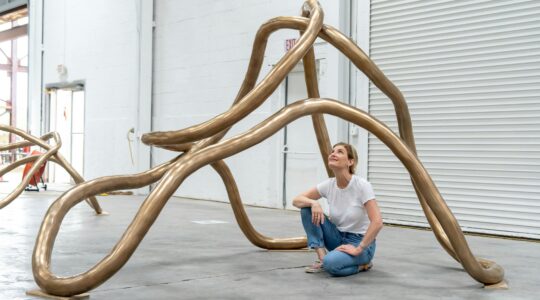A German court decision within the next several months could bring millions of dollars to a New Jersey great-grandmother who is a principal heir to the Wertheim department store empire confiscated by the Nazis in the 1930s.
The court will rule on an appeal of a German Administrative Court decision issued March 4 that awarded about 5 acres of land to the Wertheim heirs, including Barbara Principe of the South Jersey town of Newfield.
The land, which is part of the 22 acres owned by the Wertheim family before the Nazis rose to power in 1933, is valued at about $17 million. Much of the other property is also tied up in litigation.
The German government has dropped all claims to the property. The only appeal is being brought by KarstadtQuelle, the successor to a department store chain that claims to have bought the Wertheim department stores after the war. A ruling on its request to appeal is expected by the end of the summer and could pave the way for a resolution of all similar cases.
“We regard the likelihood of their success to be extremely low,” said Gary Osen of Oradell, N.J., the lawyer for Principe and her nephew, Martin Wortham of Chicago. “Assuming that no further appeal is granted, this decision will be decisive because the legal issue is identical for each of the other properties.”
Principe, 72, and Wortham are the principal heirs of the Wertheim estate, which Osen estimates to be worth between $250 million and $400 million.
A few days before the court decision, the United States formally agreed to pay $25.5 million to settle lawsuits stemming from the plundering by American troops of the so-called Hungarian Gold Train, the valuables of Hungarian Jews seized by the Nazis near the end of the Holocaust.
Although the U.S. promised at the time to try to return the valuables to their owners, the 24-car train filled with gold, jewelry, art, silverware, dishes and other family heirlooms confiscated from 800,000 Hungarian Jews was appropriated, stolen or sold while in the custody of U.S. troops, according to a report by the Presidential Advisory Commission on Holocaust Assets in the United States.
Gideon Taylor, executive vice president of the Conference on Jewish Material Claims Against Germany, said the U.S. government’s decision to pay $25.5 million to settle the suits “is an attempt to acknowledge the wrong that was committed and to make a symbolic statement through the settlement to Hungarian survivors.”
Taylor stressed that it was “important to bear in mind that were it not for the U.S., many survivors would not have survived” and that thousands of Americans died in World War II.
“It is important that people see this as an isolated episode,” Taylor said.
He said the settlement, if ultimately approved by a federal judge in Miami, would be used to support welfare programs for needy Hungarian survivors.
“There are very few survivors who can prove that they had assets on this particular train,” Taylor said in explaining why the money is not going to individual survivors.
In the Wertheim case, Principe was in the Berlin courtroom when the decision was read.
“The lawyer for the family called my lawyer and said to bring her down, it looks like we won,” she recalled.
Principe said she sat in the courtroom as the judge read the decision in German, which she did not understand.
“When he was all done, my lawyer put his thumbs up and smiled and I knew that was it,” she said.
But she said she views the decision as just another step in her quest to reclaim her past.
“It’s one more hurdle that we have overcome,” Principe said. “I feel like my past has been stolen — not just mine, but all of the others” in the family.
The Wertheim family’s property was nationalized by East Germany after the war. Osen said it totals about 50 parcels in the center of Berlin, including a particularly valuable tract called the Lenne Dreiecke at Potsdamer Platz.
“This area of land was in East Germany and when the Berlin Wall was built, it was on the West German side of the wall, even though it was legally part of East Germany,” he said. “When the property restitution law came into effect [with the collapse of East Germany in 1990], the German government said the restitution law did not apply because the land was not in East Germany. We challenged that and we won.”
Osen said he has been representing some of the Wertheim heirs for the past 13 years and that his research into what happened to the department store empire led him to conclude that the family was defrauded by its legal adviser. The adviser had counseled the family after the war to sell the business for about $5,000, insisting that it was virtually worthless and that he was doing the family a favor by offering that much.
“The generation involved in that deal is dead,” Osen said. “My clients did not even have knowledge that they were heirs to the department store empire. They had some vague notion growing up that their grandparents once owned a store, but there is a big difference between thinking you owned a store and owning [the German equivalent of] Macy’s.”
Taylor said the Claims Conference is “strongly urging” KarstadtQuelle to drop plans for an appeal.
“It is regrettable that this company has been blocking the restitution of this property for so long,” he said.
Lawyers for the Claims Conference have been fighting for the Wertheim family in German courts since 1992 because the family itself did not claim the property before the German-imposed deadline. The Claims Conference will receive 20 percent of all money awarded.
Principe, who has seven children, 14 grandchildren and four great-grandchildren, said if her case is successful, she and her husband will “take what we need to be comfortable and give the rest to the children” after setting aside a portion to contribute to cancer research.
Principe, who “snuck out of Germany in the middle of the night” with her parents and younger brother when she was 6, said she remembers nothing of her escape in 1938.
“My father had made arrangements with a freighter to take us to Holland,” she said, adding that the family then traveled to England before making its way to the United States.
In reflecting on both the Wertheim and Gold Train cases, Taylor said they “show that symbolism is important.”
“In both of them,” he said, “that acknowledgement is as important as the money.”
The New York Jewish Week brings you the stories behind the headlines, keeping you connected to Jewish life in New York. Help sustain the reporting you trust by donating today.




